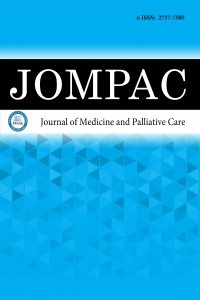1.
World Health Organisation. Sexual and reproductive health: infertility definitions and terminology. Geneva, Switzerland: WHO; 2019 Apr 12. Accessed May 20, 2024. https://www.who.int/reproductivehealth/topics/infertility/definitions/en/
2.
Abolfotouh MA, Alabdrabalnabi AA, Albacker RB, AlJughaiman UA, Hassan SN. Knowledge, attitude, and practices of infertility among Saudi couples. <em>Int J Gen Med</em>. 2013;10(6):563-573.
3.
Emekli H, Şakiroğlu M. İnfertilite tanısı alan kadınların stigma deneyimleri ve baş etme yolları: bir derleme. <em>Dünya İnsan Bilimleri Derg</em>. 2022;2(1):139-150.
4.
Yanıkkerem E, Kavlak O, Sevil U. İnfertil çiftlerin yaşadıkları sorunlar ve hemşirelik yaklaşımı. <em>Nurs Philos</em>. 2008;11(4):112-121.
5.
Yazdani F, Kazemi A, Samani HR. Studying the relationship between the attitude to ınfertility and coping strategies in couples undergoing assisted reproductive treatments. <em>J Reprod Infertil</em>. 2016;17(1):56-60.
6.
Ergin RN, Polat A, Kars B, Öztekin D, Sofuoğlu K, Çalışkan E. Social stigma and familial attitudes related to infertility. <em>TJOD</em>. 2018;15(1):46-49.
7.
Yücesoy H, Yıldırım F, Şahin E. İnfertilitenin kültürel, ekonomik, psikososyal ve cinsel yönüne güncel bir bakış: temel hemşirelik yaklaşımları. <em>Androl Bul</em>. 2021;23(1):256-263.
8.
Kamel RM. Management of the infertile couple: an evidence-based protocol. <em>Reprod Biol Endocrinol</em>. 2010;8(1):21.
9.
Cserepes RE, Kollár J, Sápy T, Wischmann T, Bugán A. Effects of gender roles, child wish motives, subjective well-being, and marital adjustment on infertility-related stress: a preliminary study with a Hungarian sample of involuntary childless men and women. <em>Arch Gynecol Obstet</em>. 2013;288(4):925-932.
10.
Bayraktar E. Toplumsal cinsiyet, kültür ve şiddetin infertilite ile ilişkisi. <em>J Health Sci</em>. 2018;27(1):234-238.
11.
Uyar EB, Özkan M, Gül T. Level of belief in sexual myths women with infertility treatment. <em>J Clin Psy</em>. 2017;20(3):209-217.
12.
Chavarro JE, Rich JW, Rosner BA, Willett WC. Diet and lifestyle in the prevention of ovulatory disorder infertility. <em>Obstet Gynecol</em>. 2007;110(5):1050-1058.
13.
Baird DT, Collins J, Egozcue J, et al. Fertility and ageing. <em>Hum Reprod Update</em>. 2005;11(3):261-276.
14.
Siyez DM, Esen E, Baran B, Seymenler S, Kağnıcı DY, Siyez E. İnfertiliteye yönelik tutum ölçeğinin geliştirilmesi: geçerlik ve güvenirlik çalışması. <em>Çukurova Med</em>. 2018;43(1):173-180.
15.
Seymenler S. Üniversite öğrencilerinin infertilite ile ilgili bilgi düzeyi ve tutumlarının incelenmesi. Doctoral thesis. İzmir, Dokuz Eylül Üniv., Eğitim Bilimleri Enstitüsü; 2017.
16.
Güner Emül T, Çokan Dönmez Ç, Vefikuluçay Yılmaz D. The determining knowledge and attitude of midwife and nurses towards infertility: descriptive research. <em>Turkiye Klinikleri J Nurs Sci</em>. 2021;13(4):815-821.
17.
Dönmez Ç, Güner Emül T. The knowledge and attitudes of nursing students infertility and determination of factors affecting these variables. <em>Ordu Üniv. Hemşirelik Çalışmaları Derg</em>. 2021;4 (3):375-381.
18.
Bunting L, Boivin J. Knowledge about infertility risk factors, fertility myths and illusory benefits of healthy habits in young people. <em>Hum Reprod</em>. 2008;23(8):1858-1864.
19.
Ali S, Sophie R, Imam AM, et al. Knowledge, perceptions and myths regarding infertility among selected adult population in Pakistan: a cross-sectional study. <em>BMC Public Health</em>. 2011;11(1): 760.
20.
El Adlani S, Benksim A, Kaddour YAB, Soummani A, Cherkaoui M. Infertility: knowledge and attitudes of Moroccan young people-gender approach. <em>Middle East Fertil Soc J</em>. 2021;26(1):14.
21.
Thomson AA, Brown M, Zhang S, et al. Evaluating acquisition of knowledge about infertility using a whiteboard video. <em>J Obstet Gynaecol Can</em>. 2016;38(7):646-650.
22.
Rouchou B. Consequences of infertility in developing countries. <em>Perspect Public Health</em>. 2013;133(3):174-179.
23.
Sharma A, Kamboj N, Saraswathy KN, Puri M, Babu N, Mahajan C. Knowledge, attitude, and practice of infertility: A comparative study in infertile and fertile Indian women. <em>J Biosoc Sci</em>. 2023;55 (5):947-959.
24.
Keskin, G, Babacan Gümüş A. Infertility: an examination hopelessness perspective. <em>Int J Nurs Stud</em>. 2014;5(1):9-16.
25.
Donkor ES, Sandall J. The impact of perceived stigma and mediating social factors on infertility-related stress among women seeking infertility treatment in Southern Ghana. <em>Soc Sci Med</em>. 2007;65(8):1683-1694.
26.
Missmer SA, Seifer DB, Jain T. Cultural factors contributing to health care disparities among patients with infertility in Midwestern United States. <em>Fertil Steril</em>. 2011;95(6):1943-1949.
27.
Ying LY, Wu LH, Loke AY. Gender differences in experiences with and adjustments to infertility: A literature review. <em>Int J Nurs Stud</em>. 2015;52(10):1640-1652.
28.
Iktidar MA, Chowdhury S, Roy S, et al. Knowledge, attitude and perception among medical students and healthcare professionals regarding male infertility: a cross-sectional survey from Bangladesh. <em>BMJ Open</em>. 2022;12(11):062251.
29.
Acar Z, Güngör Satilmiş İ. Cultural perspective on infertility in Turkish society: the İstanbul sample. <em>İzmir Democracy Univ Health Sci J</em>. 2022;5(3):635-650.

